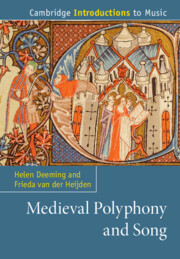Book contents
- Cambridge Introductions to Music
- Medieval Polyphony and Song
- Copyright page
- Dedication
- Contents
- Figures
- Tables
- Boxes
- Music Examples
- Acknowledgements
- Chapter 1 Introduction and Historical Outline
- Chapter 2 Monastic Centres in the Early Middle Ages
- Chapter 3 Court and Cloister in Aquitaine and Occitania
- Chapter 4 Paris: City, Cathedral, and University
- Chapter 5 Courts and Cities in Northern France
- Chapter 6 Scribes, Scholars, and Secretaries in Fourteenth-Century France
- Chapter 7 England after the Norman Conquest
- Chapter 8 On the Shores of the Mediterranean: Italy, Sicily, and the Iberian Peninsula
- Chapter 9 The German- and Dutch-Speaking Lands
- Chapter 10 Medievalisms: Modern Encounters with Medieval Polyphony and Song
- Glossary
- Bibliography
- Discography
- Index
- Cambridge Introductions to Music
- References
Chapter 10 - Medievalisms: Modern Encounters with Medieval Polyphony and Song
Published online by Cambridge University Press: 27 April 2023
- Cambridge Introductions to Music
- Medieval Polyphony and Song
- Copyright page
- Dedication
- Contents
- Figures
- Tables
- Boxes
- Music Examples
- Acknowledgements
- Chapter 1 Introduction and Historical Outline
- Chapter 2 Monastic Centres in the Early Middle Ages
- Chapter 3 Court and Cloister in Aquitaine and Occitania
- Chapter 4 Paris: City, Cathedral, and University
- Chapter 5 Courts and Cities in Northern France
- Chapter 6 Scribes, Scholars, and Secretaries in Fourteenth-Century France
- Chapter 7 England after the Norman Conquest
- Chapter 8 On the Shores of the Mediterranean: Italy, Sicily, and the Iberian Peninsula
- Chapter 9 The German- and Dutch-Speaking Lands
- Chapter 10 Medievalisms: Modern Encounters with Medieval Polyphony and Song
- Glossary
- Bibliography
- Discography
- Index
- Cambridge Introductions to Music
- References
Summary
The story of how medieval polyphony and song have been approached in more recent times is the subject of our final chapter. We look at how the appearance of modern editions of medieval poetry allowed composers in the first half of the twentieth century, such as Carl Orff and Benjamin Britten, to set medieval song-texts to new music. It would take until after World War II, however, for the music of medieval polyphony and song to reach wide audiences, and we chart the history of the recordings, concerts, and festivals that have brought this music to listeners from 1950 onwards. We examine the approaches of the pioneering ensembles and directors who first performed and recorded this music in the 1950s and 1960s, looking at their influences and attitudes towards the many unknowns regarding its original performance practice. Situating the re-awakening of medieval music in the wider context of the early music revival and the ‘authentic’ (later, ‘historically-informed’) performance movements, we then move on to consider ‘medievalist’ music, especially in film, television, and video games with medieval settings.
Keywords
- Type
- Chapter
- Information
- Medieval Polyphony and Song , pp. 203 - 218Publisher: Cambridge University PressPrint publication year: 2023

